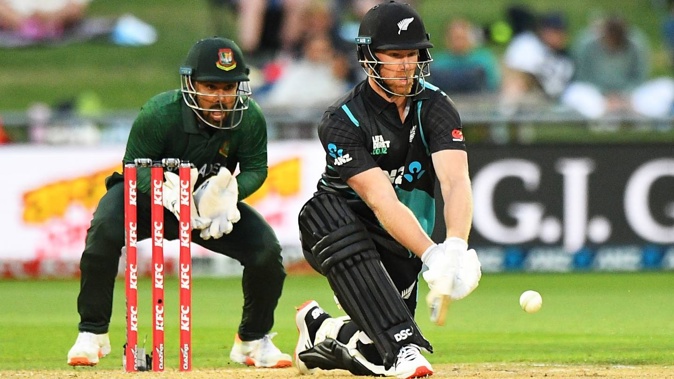
It’s not the losing that worries Jimmy Neesham and the Black Caps — it’s how they’re losing.
And after a couple of results that have been “difficult to swallow”, New Zealand must quickly shake off the shocking batting collapses that brought about those defeats by Bangladesh.
Four days after the hosts were dismissed for 98 in the final ODI, a much-changed batting group slumped to 20-4 en route to another loss in the first T20 on Wednesday night.
Both results at McLean Park were historic, Bangladesh beating the Black Caps in New Zealand for the first time in the two limited-overs formats. But while one could be waved away — a dead rubber in an irrelevant series — the second was much more consequential.
Bangladesh now have two chances to earn a maiden series victory of any kind in New Zealand. And the next T20 World Cup, in the West Indies and United States, is little more than five months away.
Starting this cycle with an unprecedented setback would be less than ideal. But ahead of Friday night’s second match at Mount Maunganui, providing forecast rain stays away, Neesham knows his side has little time to reverse a worrying slide.
“You can’t dwell too much on a loss. The way you lose is probably more important than the actual loss,” Neesham said.
“We’ve got nowhere to go now. We’ve got to win two in a row to win the series. So we’ll go away and more have a think — we don’t have the time to actually work on things — have a refresh and have a talk about where we went wrong.”
That conversation will likely centre on how the Black Caps played the new ball, or, in Glenn Phillips’ case, how they didn’t.
As in the third ODI, New Zealand were asked to bat in the first T20 and once more they battled when the Bangladesh bowlers generated movement in helpful but hardly inhospitable conditions.
The top order was new, only Mark Chapman and Adam Milne played both matches, but the result was the same, as Phillips’ ill-considered leave of a straight delivery from Shoriful Islam saw a third wicket fall inside two overs.
/cloudfront-ap-southeast-2.images.arcpublishing.com/nzme/HL2OSIXLZFA4TFR7HSKAR3DF6U.JPG)
Bangladesh experienced greater difficulty chasing the Black Caps’ 134-9 than while overhauling 98 a few days earlier. But the tourists again appeared far more comfortable on an unfamiliar surface, reaching their target with five wickets and eight balls to spare.
It’s rare for the Black Caps to be comprehensively outplayed in consecutive matches at home. When it does happen, the opponent is generally a cricket heavyweight: India in an ODI series in 2019 and T20s the following year; Australia in a T20 series in 2021.
But Neesham, who top-scored with 48 from 29 balls, credited Bangladesh’s ever-improving seam attack for denying the Black Caps any comfort at home.
“We probably need to respect the conditions a little bit more,” the veteran allrounder said. “We’ve seen the ball moving around quite significantly, especially in the top six overs today and the 10 overs in the ODIs. That’s not something we’re used to seeing in New Zealand very often in white-ball cricket, so we probably need to have a discussion about that.
“But Bangladesh have unearthed a couple of quality seamers recently and they’ll be pretty happy with their seam stocks at the moment. If they can continue developing like that then I see no reason why they can’t have more success in overseas tours.”
The Black Caps’ batters will be pleased to leave behind Napier and enjoy a couple of outings on what’s generally a good track at Bay Oval, where in eight completed matches the hosts have averaged a total of 187. Neesham, though, added a note of caution.
“It’s challenging — probably another ground that suits Bangladesh a little bit with their spinners,” he said. “So we certainly have our hands full looking at the series.”
Kris Shannon has been a sports journalist since 2011 and covers a variety of codes for the Herald. Reporting on Grant Elliott’s six at Eden Park in 2015 was a career highlight.
Take your Radio, Podcasts and Music with you









